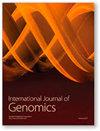Circ_0078767通过吸附miR-665调节GPX3表达抑制非小细胞肺癌癌症的进展
IF 2.6
4区 生物学
Q3 BIOCHEMISTRY & MOLECULAR BIOLOGY
引用次数: 3
摘要
非小细胞肺癌(NSCLC)是最严重的癌症之一。环状RNA_0078767 (circ_0078767)在NSCLC组织中的表达降低。然而,circ_0078767的分子机制尚不清楚。采用实时荧光聚合酶链式反应(qRT-PCR)检测circ_0078767、microRNA-665 (miR-665)和谷胱甘肽过氧化物酶3 (GPX3)的表达。分别用菌落形成法和transwell法检测细胞增殖、迁移和侵袭。采用糖酵解法测定乳酸产量和葡萄糖消耗量。Western blot检测了己糖激酶-2 (HK2)、基质金属蛋白酶-9 (MMP9)和GPX3细胞的蛋白水平。Circinteractome预测了miR-665与circ_0078767或GPX3之间的关系,并通过双荧光素酶报告基因试验进行了验证。建立异种移植模型,研究circ_0078767在体内的作用。circ_0078767和GPX3在NSCLC组织中表达降低,miR-665表达升高。Circ_0078767可以海绵miR-665, GPX3是miR-665的靶点。体外补体实验表明,敲低circ_0078767可显著促进NSCLC的恶性行为,而共转染miR-665抑制剂可部分降低这一变化。此外,GPX3过表达降低了miR-665上调对NSCLC细胞增殖、迁移和侵袭的促进作用。机制上,circ_0078767通过海绵状miR-665调控GPX3在NSCLC细胞中的表达。此外,体内研究表明,下调circ_0078767可促进肿瘤生长。Circ_0078767沉默通过调节miR-665/GPX3轴促进NSCLC细胞的增殖、迁移、侵袭和糖酵解,提示Circ_0078767 /miR-665/GPX3轴可能是治疗NSCLC的潜在调节机制。本文章由计算机程序翻译,如有差异,请以英文原文为准。
Circ_0078767 Inhibits the Progression of Non-Small-Cell Lung Cancer by Regulating the GPX3 Expression by Adsorbing miR-665
Non-small-cell lung cancer (NSCLC) is one of the most serious cancers. The circular RNA_0078767 (circ_0078767) expression was decreased in NSCLC tissues. However, the molecular mechanism of circ_0078767 remains unknown. The expression of circ_0078767, microRNA-665 (miR-665), and glutathione peroxidase 3 (GPX3) was detected by quantitative real-time fluorescence polymerase chain reaction (qRT-PCR). Cell proliferation, migration, and invasion were detected by colony formation assay and transwell assay, respectively. The lactate production and glucose consumption were tested by glycolysis. Western blot examined the protein levels of hexokinase-2 (HK2), matrix metalloproteinase-9 (MMP9), and GPX3 cells. Circinteractome predicted the relationship between miR-665 and circ_0078767 or GPX3 and was verified by dual luciferase reporter assays. The xenotransplantation model was established to study the role of circ_0078767 in vivo. The expression of circ_0078767 and GPX3 was decreased in NSCLC tissues, while the expression of miR-665 was increased. Circ_0078767 can sponge miR-665, and GPX3 is the target of miR-665. In vitro complement experiments showed that knockdown of circ_0078767 significantly promoted malignant behavior of NSCLC, while cotransfection of miR-665 inhibitor partially reduced this change. In addition, the GPX3 overexpression decreased the promoting effects of miR-665 upregulation on proliferation, migration, and invasion of NSCLC cells. Mechanically, circ_0078767 regulates the GPX3 expression in NSCLC cells by spongy miR-665. In addition, in vivo studies have shown that downregulation of circ_0078767 promotes tumor growth. Circ_0078767 silencing promotes proliferation, migration, invasion, and glycolysis of NSCLC cells by regulating the miR-665/GPX3 axis, suggesting that circ_0078767/miR-665/GPX3 axis may be a potential regulatory mechanism for the treatment of NSCLC.
求助全文
通过发布文献求助,成功后即可免费获取论文全文。
去求助
来源期刊

International Journal of Genomics
BIOCHEMISTRY & MOLECULAR BIOLOGY-BIOTECHNOLOGY & APPLIED MICROBIOLOGY
CiteScore
5.40
自引率
0.00%
发文量
33
审稿时长
17 weeks
期刊介绍:
International Journal of Genomics is a peer-reviewed, Open Access journal that publishes research articles as well as review articles in all areas of genome-scale analysis. Topics covered by the journal include, but are not limited to: bioinformatics, clinical genomics, disease genomics, epigenomics, evolutionary genomics, functional genomics, genome engineering, and synthetic genomics.
 求助内容:
求助内容: 应助结果提醒方式:
应助结果提醒方式:


